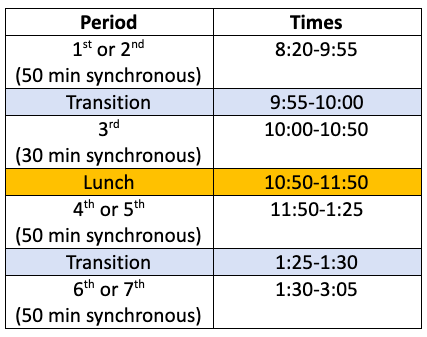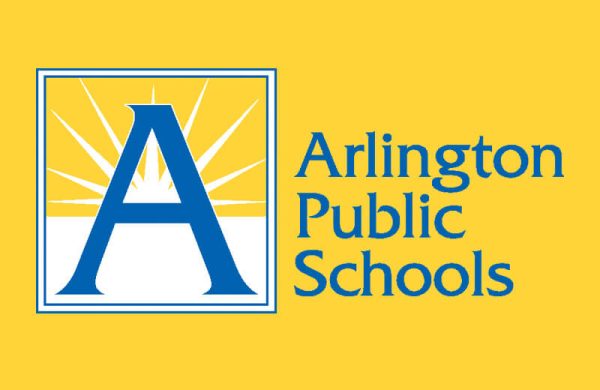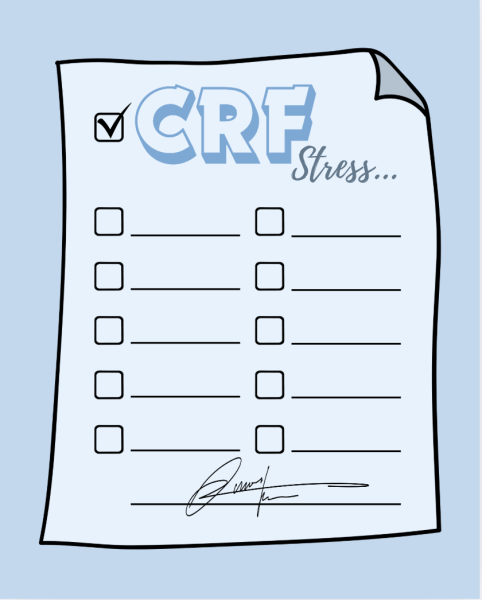Ten things you need to know about virtual learning

This is the schedule for virtual school. It will go into effect on September 8, when school begins.
As school begins in this unusual year, it’s understandable to be confused by how grading, assessments and schedules will work virtually. Never fear–here are ten things you need to know about virtual learning.
- The schedule
This will be the distance learning schedule every Tuesday through Friday. Throughout the school day, you’ll attend synchronous classes for at least fifty minutes, or thirty minutes for the shorter third period classes. Synchronous classes are interactive and happen in real time. The rest of the period could either be filled with more synchronous learning or individual (officially called asynchronous) work.
Remember how Mondays are missing from the schedule? That’s because those days will include teacher office hours, where you can reach out to your teacher for help, and Social Emotional Learning (SEL) instruction, which is explained in #4.
- What synchronous learning will look like
During synchronous learning, you don’t have to plan on spending the period listening to an all-class lecture; instead, teachers can split the class into smaller groups for discussion or to complete work together. Here’s an example of what class may look like: a whole class introduction to an activity, then small group work followed by an all-class reflection. Just like last spring, students will have the choice to keep cameras off or on.
- What asynchronous learning will look like
Asynchronous learning includes assignments that students will do individually, from watching video recorded lessons to completing discussion boards. These activities should take 30 to 45 minutes to complete, and you won’t be required to print anything, just in case you don’t have access to a printer. This instruction is meant to be flexible and self-paced. Teachers will be available during this time to give feedback or answer questions. Additional homework won’t be required outside of this asynchronous time, though Advanced Placement (AP), Dual Enrollment (DE), and International Baccalaureate (IB) classes may require more work.
- Social and Emotional Learning instruction
Social Emotional Learning (SEL) classes will be held for 30 minutes a week on Mondays. The topic for high school instruction is “Sources of Strength,” which was a program the counseling department adopted last year. These video-recorded lessons will be on Canvas. More lessons, such as information about college applications or bullying, will also be available. If you’re interested in speaking with your counselor, they will hold daily office hours where students and their families can schedule appointments.
- Attendance
Attendance will be taken every period, and students also have to attend Generals’ Period (GP) on Mondays.
- Assessments
This time, we’re getting graded. Unlike last spring, teachers will be allowed to give mandatory and graded assessments in the form of essays, tests, and projects. Exit tickets and small check-in assignments are other methods teachers can use to assess students.
- Tech support
If you experience connectivity issues, you should be sure to email the teachers of the course you are missing. Next, you can submit the problem to the school’s tech help form (https://www.apsva.us/digital-learning/contact-itc/) or email [email protected]. To make sure your absence is accounted for, report issues to the school’s attendance hotline no later than 11 a.m.
- Support for students with disabilities
If you have an IEP or 504 accommodation, teachers will review your plan to ensure it is implemented. Your accommodations may include alternative assignments, copies of notes and handouts to assist with note-taking or a slower pace of assignments.
- Support for English learners
If you attend English language development (ELD) classes, those will be included in your schedule, so you can get the support you need during that period.
- A quick to-do list
In the fall, students will be expected to:
- Add a photo or bitmoji of themselves to their Canvas and Teams profile
- Mute microphones when not speaking
- Use the “raise hand” button if they have a question
- Decide whether to turn on their camera
- Keep assessment content secure and confidential
- Not receive assistance on assessments from any individual or resource without approval from the teacher
Go to the county’s guide for more information! https://www.apsva.us/wp-content/uploads/2020/08/Secondary-Parent-Guide.pdf













Johnny B. • Sep 3, 2020 at 12:46 PM
Very helpful article! Well written and informative. Will be bookmarking tomorrow help the kids.